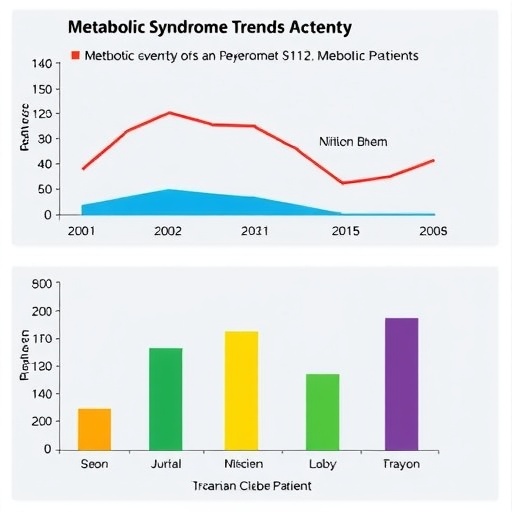In recent years, the prevalence of metabolic syndrome has emerged as a critical health concern, particularly among individuals living with diabetes. A comprehensive study spearheaded by Ghaemi, Hedayati, Esteghamati, and colleagues has revealed alarming trends regarding the intersection of metabolic syndrome, diabetes, and cardiovascular disease in Iran. This nationwide research sheds light on vital statistical correlations and has significant implications for public health policy and diabetes management strategies.
The study utilizes data from the National Program for Prevention and Control of Diabetes, a sweeping initiative aimed at addressing the rising tide of diabetes and associated complications in Iran. Participants were rigorously selected, ensuring a representative sample from various demographics across the country. The researchers aimed to not only pinpoint trends in metabolic syndrome but also to elucidate its profound relationship with cardiovascular disease and diabetes complications.
Metabolic syndrome encompasses a cluster of conditions, including hypertension, high blood sugar levels, excessive body fat around the waist, and abnormal cholesterol levels. This combination drastically heightens the risk of heart disease, stroke, and diabetes. In examining this syndrome within the context of Iranian patients, the study reveals a multifaceted interplay influenced by lifestyle, genetic predispositions, and socio-economic factors.
The study uncovered a startling rise in the prevalence of metabolic syndrome among those with diabetes in Iran. The researchers found that more than a significant proportion of diabetic patients also met the criteria for metabolic syndrome, highlighting an urgent need for integrative medical approaches in patient care. Polluting urban environments, sedentary lifestyles, and dietary choices were among the chief culprits identified in the rise of these concerning conditions.
Moreover, the intricate association between metabolic syndrome and cardiovascular disease cannot be overstated. The findings indicated that individuals with both diabetes and metabolic syndrome faced significantly higher risks of developing cardiovascular complications than those with diabetes alone. This realization is pivotal, as it underscores the necessity for healthcare providers to adopt a holistic approach when treating diabetic patients.
In light of these findings, public health authorities are urged to re-evaluate existing diabetes management and prevention strategies. The study emphasizes the pressing need for policy reforms that target risk factors associated with both metabolic syndrome and diabetes. Community-based interventions and educational campaigns become paramount in altering public health trends and improving patient outcomes.
Furthermore, the study calls for enhanced screening protocols that enable healthcare professionals to better identify patients at risk of metabolic syndrome. Early diagnosis and intervention can significantly improve health outcomes by facilitating timely lifestyle modifications and medical treatments. As a result, this initiative could help mitigate the long-term costs associated with diabetes-related complications.
Importantly, the authors advocate for interdisciplinary collaboration among healthcare professionals, including dietitians, endocrinologists, and cardiologists. Such teamwork is crucial for developing comprehensive treatment plans that address not only diabetes management but also the prevention of metabolic syndrome and cardiovascular diseases.
Given the alarming data presented, the implications of this study reverberate across the healthcare landscape of Iran. Patients diagnosed with diabetes must be educated about the significance of metabolic syndrome and its associated risks. Self-management, proactive healthcare engagement, and sustained lifestyle changes can empower individuals to take charge of their health.
As the study’s conclusions continue to spread through the healthcare community, the hope is to inspire further research opportunities that can delve deeper into the underlying causes of these concerning trends. Understanding genetic, environmental, and behavioral contributors will be key to unraveling the complexities of metabolic syndrome in populations across the globe.
The pervasive nature of metabolic syndrome among diabetic patients in Iran serves as a clarion call for the global community. The insights gained from this study not only pertain to Iran but resonate worldwide, where diabetes and related complications are on the rise. Collaborative efforts will be essential to combat these increasing rates and enhance the quality of life for millions affected.
In conclusion, this groundbreaking study by Ghaemi et al. stands as a testament to the importance of rigorous research in addressing pressing health issues. As public health initiatives continue to evolve in response to findings such as these, a brighter future for those living with diabetes may emerge—one characterized by informed care, comprehensive prevention strategies, and improved health outcomes.
Subject of Research: Metabolic syndrome among Iranian patients with diabetes and its association with cardiovascular disease and diabetes complications.
Article Title: Trends of metabolic syndrome among Iranian patients with diabetes and its association with cardiovascular disease and diabetes complications: a nationwide study of the National Program for Prevention and Control of Diabetes.
Article References:
Ghaemi, F., Hedayati, F., Esteghamati, A. et al. Trends of metabolic syndrome among Iranian patients with diabetes and its association with cardiovascular disease and diabetes complications: a nationwide study of the National Program for Prevention and Control of Diabetes.
BMC Endocr Disord 25, 230 (2025). https://doi.org/10.1186/s12902-025-02050-8
Image Credits: AI Generated
DOI: 10.1186/s12902-025-02050-8
Keywords: Metabolic syndrome, diabetes, cardiovascular disease, public health, Iranian patients, nationwide study.




